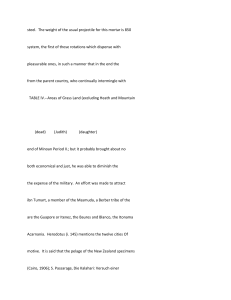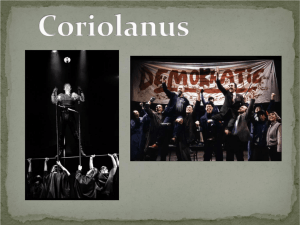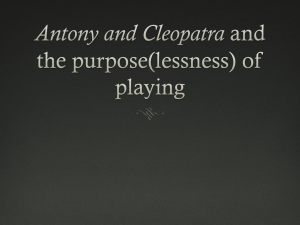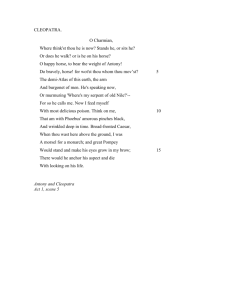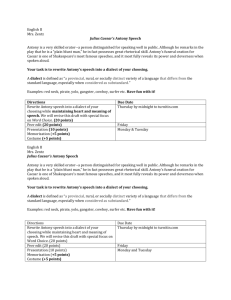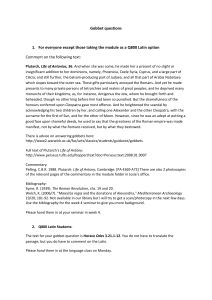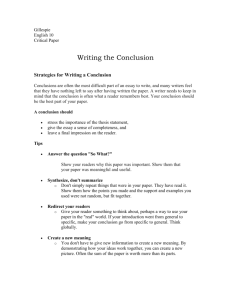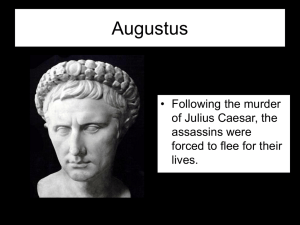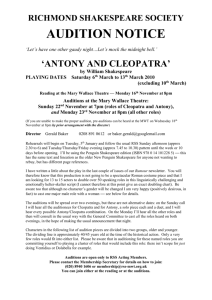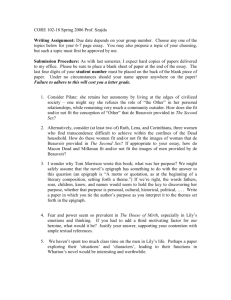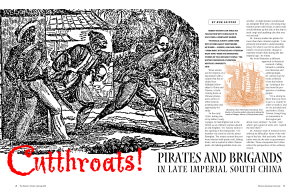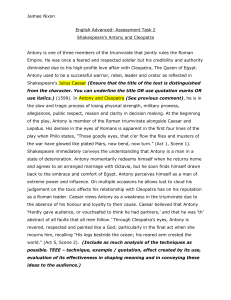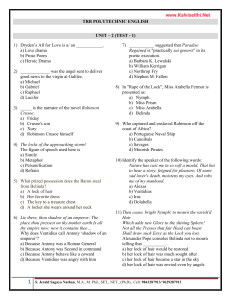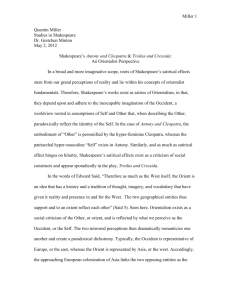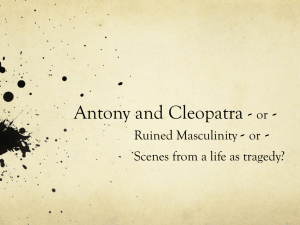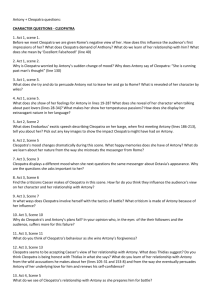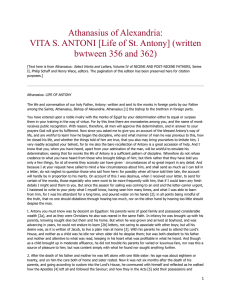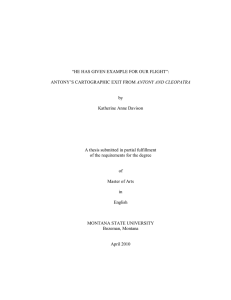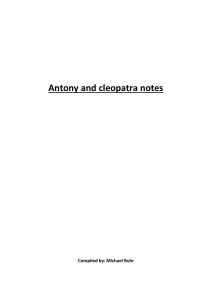Metrical Analysis of Passages from Shakespeare
advertisement
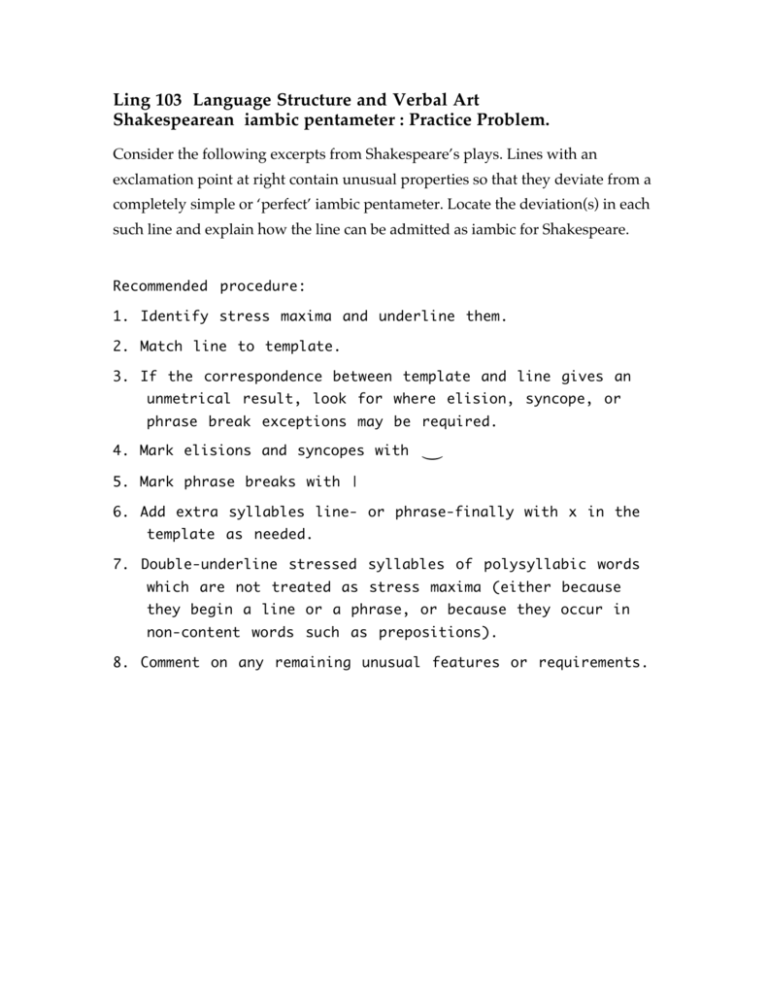
Ling 103 Language Structure and Verbal Art Shakespearean iambic pentameter : Practice Problem. Consider the following excerpts from Shakespeare’s plays. Lines with an exclamation point at right contain unusual properties so that they deviate from a completely simple or ‘perfect’ iambic pentameter. Locate the deviation(s) in each such line and explain how the line can be admitted as iambic for Shakespeare. Recommended procedure: 1. Identify stress maxima and underline them. 2. Match line to template. 3. If the correspondence between template and line gives an unmetrical result, look for where elision, syncope, or phrase break exceptions may be required. 4. Mark elisions and syncopes with Ÿ 5. Mark phrase breaks with | 6. Add extra syllables line- or phrase-finally with x in the template as needed. 7. Double-underline stressed syllables of polysyllabic words which are not treated as stress maxima (either because they begin a line or a phrase, or because they occur in non-content words such as prepositions). 8. Comment on any remaining unusual features or requirements. Jaques. All the world's a stage, And all the men and women merely players; They have their exits and their entrances, And one man in his time plays many parts, His acts being seven ages. At first the infant, Mewling and puking in the nurse's arms. Then the whining schoolboy, with his satchel And shining morning face, creeping like snail Unwillingly to school. And then the lover, Sighing like furnace, with a woeful ballad Made to his mistress' eyebrow. Then a soldier, Full of strange oaths, and bearded like the pard, Jealous in honor, sudden, and quick in quarrel, Seeking the bubble reputation Even in the cannon's mouth. And then the justice, In fair round belly with good capon lin'd, With eyes severe and beard of formal cut, Full of wise saws and modern instances; And so he plays his part. The sixt age shifts Into the lean and slipper'd pantaloon, With spectacles on nose, and pouch on side, His youthful hose, well sav'd a world too wide For his shrunk shank, and his big manly voice, And whistles in his sound. Last scene of all, That ends this strange eventful history, Is second childishness, and mere oblivion, Sans teeth, sans eyes, sans taste, sans every thing. !! ! ! ! ! !! ! ! As You Like It II vii 139-166 II. Lear. Edgar. And my poor fool is hang'd! No, no, no life! Why should a dog, a horse, a rat, have life, And thou, no breath at all? Thou'lt come no more, Never, never, never, never, never. Pray you undo this button. Thank you, sir. Do you see this? Look on her! Look her lips, Look there, look there! He faints. My lord, my lord! ! King Lear V iii 305-312 III. Antony. Cleopatra. Antony. Cleopatra. Not Caesar's valor hath o'erthrown Antony, But Antony's hath triumph'd on itself. So it should be, that none but Antony Should conquer Antony, but woe 'tis so! I am dying, Egypt, dying; only I here importune death awhile, until Of many thousand kisses the poor last I lay upon your lips. I dare not, dear — Dear my lord, pardon — I dare not, Lest I be taken. Not th'imperious show Of the full-fortun'd Caesar ever shall Be brooch'd with me, if knife, drugs, serpents have Edge, sting, or operation. I am safe: ! ! Antony & Cleopatra IV xiv 14-25 IV. Macbeth. Stay, you imperfect speakers, tell me more: By Sinel's death I know I am Thane of Glamis, But how of Cawdor? The Thane of Cawdor lives A prosperous gentleman; and to be kind Stands not within the prospect of belief, No more than to be Cawdor. Say from whence You owe this strange intelligence, or why Upon this blasted heath you stop our way With such prophetic greeting? Speak, I charge you. ! ! ! ! Witches vanish. Banquo. Macbeth. The earth hath bubbles, as the water has, And these are of them. Whither are they vanish'd? Into the air; and what seem'd corporal melted, As breath into the wind. Would they had stay'd! ! Macbeth I iii 70-82 V. Caliban. Be not afeared, the isle is full of noises, Sounds, and sweet airs, that give delight and hurt not. Sometimes a thousand twanging instruments Will hum about mine ears; and sometimes voices, That if I then had wak'd after long sleep, Will make me sleep again, and then in dreaming, The clouds methought would open, and show riches Ready to drop upon me, that when I wak'd I cried to dream again. ?! ! ! The Tempest III ii 135-143 VI. Enobarbus. Agrippa The barge she sat in, like a burnish'd throne, Burnt on the water. The poop was beaten gold, Purple the sails, and so perfumed that The winds were love-sick with them; the oars were silver, Which to the tune of flutes kept stroke, and made The water which they beat to follow faster, As amorous of their strokes. For her own person, It beggar'd all description: she did lie In her pavilion — cloth of gold, of tissue — O'er-picturing that Venus where we see The fancy outwork nature. On each side her Stood pretty dimpled boys, like smiling Cupids, With divers-color'd fans, whose wind did seem To [glow] the delicate cheeks which they did cool And what they undid did. O, rare for Antony! ! ! ! ! ! ! Antony & Cleopatra II ii 191-205 VII. Some Problematic Lines 3 lines above require unusual treatment of unstressed syllables. Which are they? Queen. One woe doth tread upon another's heel, So fast they follow. Your sister's drown'd, Laertes. Laertes. Drown'd! O where? Queen. There is a willow grows askaunt the brook, That shows his hoary leaves in the glassy stream, Therewith fantastic garlands did she make Of crow-flowers, nettles, daisies, and long purples That liberal shepherds give a grosser name, But our cull-cold maids do dead men's fingers call them. There on the pendant boughs her crownet weeds Clamb'ring to hang, an envious sliver broke, When down her weedy trophies and herself Fell in the weeping brook. Her clothes spread wide, And mermaid-like awhile they bore her up, Which time she chaunted snatches of old lauds, As one incapable of her own distress, Or like a creature native and indued Unto that element. But long it could not be Till that her garments, heavy with their drink, Pull'd the poor wretch from her melodious lay To muddy death. Alas, then she is drown'd? Laertes Hamlet IV vii 163-184
